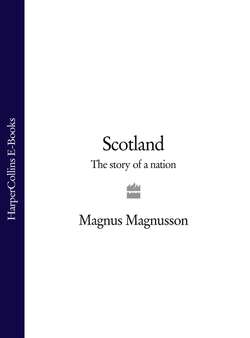Читать книгу Scotland: The Story of a Nation - Magnus Magnusson - Страница 19
The Gododdin
ОглавлениеWhile the Picts were the power in the north, another martial kingdom had been developing to the south of the Firth of Forth, in the Lothians – the home of the British tribe known to the Romans as Votadini. During the Roman occupation they had been a client kingdom, or at least had lived peaceably under Roman subjugation; archaeologists have found a major hoard of rather battered Roman silverware which was buried at Traprain Law in the fifth century, after the Roman withdrawal.
By 600, however, the Votadini had their stronghold in Edinburgh (Din Eidyn), and emerged in history under their proper British, or Old Welsh, name of ‘Gododdin’ in an elegiac heroic poem called Y Gododdin, composed by a local bard named Aneirin at about that time. The poem tells the story of a raiding expedition mounted by the king of the Gododdin, Mynyddawg Mwynfawr, who ruled territories stretching from the Forth to the Tees. He gathered a princely war-band of 360 chosen champions from all over his realm and even farther afield. For a year they feasted and caroused in the towering timber hall of his stronghold in Edinburgh, wearing robes of purple and gold, with gold brooches and neck-bands, drinking from goblets of gold or silver. Then they pledged themselves, according to ancient custom, to conquer or die in the service of their lord. Next morning they went clattering down the Castle Rock, riding southward deep into the lands of the Angles. The encounter took place at ‘Catraeth’, identified as Catterick in what is now Yorkshire:
Men went to Catraeth, they were renowned.
Wine and mead from gold cups was their drink.
A year in noble ceremonial,
Three hundred and sixty gold-torqued men.
Of all those who charged, after too much drink,
But three won free through courage in strife,
Aeron’s two war-hounds and tough Cynon,
And myself, soaked in blood, for my song’s sake.
Gododdin’s war-band on shaggy mounts,
Steeds the hue of swans, in full harness,
Fighting for Eidyn’s treasure and mead.
On Mynyddawg’s orders
Shields were battered to bits,
Sword-blades descended
On pallid cheeks.
They loved combat, broad line of attack:
They bore no disgrace, men who stood firm.
FROM THE GODODDIN (TRANS. JOSEPH P. CLANCY)
It was the very stuff of heroic legend, that ferocious, unforgiving battle.
Legendary or not, historical fact or poetic fiction, the power of the Gododdin was certainly broken a few years later. In 638 Din Eidyn was besieged and captured by the avenging Angles, and the place seems then to have received the anglicised name Edinburgh, by which it is known today.
